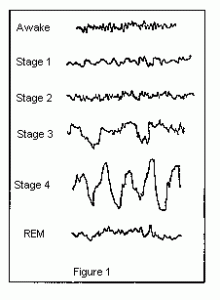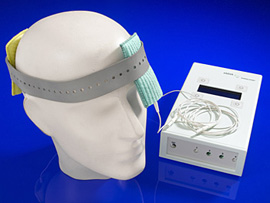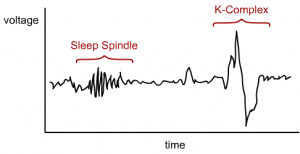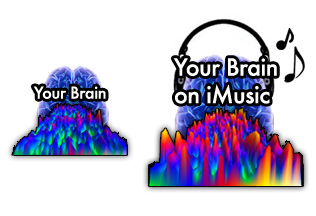Evidence of Learning New Things While Sleeping
 Many of the emails and comments I get have to do with sleep learning. Readers ask if it possible to learn something new while they sleep. So I am always on the lookout for scientific studies that claim we can be taught new concepts or skills while we sleep. Unfortunately, I have not been able to find studies that demonstrate that scientifically, until now.
Many of the emails and comments I get have to do with sleep learning. Readers ask if it possible to learn something new while they sleep. So I am always on the lookout for scientific studies that claim we can be taught new concepts or skills while we sleep. Unfortunately, I have not been able to find studies that demonstrate that scientifically, until now.
Research done at the Weizmann Institute and reported in Nature Neuroscience demonstrates that we are able to learn an association between smells and tones while we sleep. Specially researchers:
“… found that if certain odors are presented after tones during sleep, people will start sniffing when they hear the tones alone – even when no odor is present – both during sleep and, later, when awake. In other words, people can learn new information while they sleep, and this can unconsciously modify their waking behavior.”
So you can learn to sniff in response to a tone while asleep. This does not prove that we can learn more complex and important things while asleep but it does show some new learning is possible. It provides encouragement for personal experimentation with sleep learning. I am interested to hear from readers of the Next Brain Blog that use some form of sleep learning technique. How has it improved your brain function or cognitive performance?
Source of Image: Brain Basics – Understanding Sleep
Categories: Memory and Learning, Music and Audio, Sleep Tags:
Light Intensity Impacts Cognitive Performance
 Does the amount of light hitting your eyes impact your alertness and cognitive performance? If so, do we perform better in bright, normal or dim lighting?
Does the amount of light hitting your eyes impact your alertness and cognitive performance? If so, do we perform better in bright, normal or dim lighting?
According to research just reported in the journal Behavioral Neuroscience, the answer is yes, the intensity of light does impact our feeling of sleepiness and how well we objectively perform on a memory test.
What they found was that we are more alert and have improved memory in a room with natural/normal levels of lightening as compared to a room with dim lighting. They did not test for the effects of brighter than normal light.
Although a seemingly minor effect, room lighting is a variable we can control. I’m an interested to hear from readers about studies that measure the impact of lighting effects on brain function and cognitive performance.
Source: Image of Light Intensity in Room
Categories: Memory and Learning, Sleep Tags:
Can Singing Significantly Improve Brain Function?
 The answer is yes according to the makers of SingFit an App for the iPhone and iPad that is due out in just a couple of weeks. Grounded in well-established principles from music therapy they claim:
The answer is yes according to the makers of SingFit an App for the iPhone and iPad that is due out in just a couple of weeks. Grounded in well-established principles from music therapy they claim:
“Scientific studies have shown that singing in general positively impacts the levels of hormones responsible for regulating mood, blood pressure and social bonding, including serotonin, cortisol and oxytocin. Furthermore, singing has been proven to help increase immune system strength and respiratory function while decreasing stress, pain and agitation. Imaging studies also reveal that singing can promote cross hemisphere brain activity, which can increase mental neuroplasticity and improve cognitive functioning.”
The app is free but they hope to sell you a $13 a month subscription for more content. I’d like to hear from readers that use this app or other forms of music therapy to build brain function and improve cognitive performance.
Categories: Ancient Ways, Memory and Learning, Music and Audio, Problem Solving, Sleep Tags:
Can Pulsed Light-and-Sound Enhance Your Brain?
 The idea behind mind machines is intriguing. They are simple devices that use pulsed sound and light to trick your brainwaves into certain patterns and put you in specific mental states such as relaxation or alertness. The question is do they really work?
The idea behind mind machines is intriguing. They are simple devices that use pulsed sound and light to trick your brainwaves into certain patterns and put you in specific mental states such as relaxation or alertness. The question is do they really work?
There is some scientific evidence that brainwave entrainment can have a therapeutic impact. There are a handful of small companies that manufacture and have sold mind machines for decades. Yet they remain on the fringe.
While I am not endorsing any specific product or company, you can learn more by checking out this video by the folks at Mind Alive. One of their mind machines (pictured to the right) runs about $500.
In the video they talk about how this technology delivers a “made to order mental state”. They also emphasize that given its ability to help manage stress it should be in every home. Perhaps if we had an iPhone or Droid app that turns a smart phone into a mind machine that will happen.
Very interested to hear from readers that use some form of mind machine. How long have you used it? What effects does it produce?
Categories: Mental Focus, Music and Audio, Other, Sleep Tags: Brainwave Entrainment
Small Direct Current Boosts Brain Function
 A recent study conducted at Oxford University on the use of transcranial direct current stimulation (tDCS) to improve math skills is getting considerable attention. A small group of college students received a tiny direct current to the parietal lobe for 20 minutes per day for six days. They showed a significant improvement in numerical ability (representation of artificial numeric symbols) that persisted for as long as six months.
A recent study conducted at Oxford University on the use of transcranial direct current stimulation (tDCS) to improve math skills is getting considerable attention. A small group of college students received a tiny direct current to the parietal lobe for 20 minutes per day for six days. They showed a significant improvement in numerical ability (representation of artificial numeric symbols) that persisted for as long as six months.
I have seen other studies that claim tDCS can improve creativity, declarative memory, visual memory, motor skills and pain relief as well as speed stroke recovery.
I am not aware of any devices and training protocols available to the general public. Interested to hear from readers that use tDCS.
Categories: Memory and Learning, Sleep Tags:
Light Sleep Enough to Integrate New Memories
In the Next Brain Blog we review techniques that are proven to enhance brain function and cognitive performance. Sometimes the techniques are mundane such as proper nutrition, aerobic exercises and sleep. But even when they are mundane we search for the twists or specifics that can transform the obvious into a unique insight or practice.
Take sleep for example. Earlier posts discussed how dreaming can improve responses to a maze navigation problem by a factor of 10, how you can focus your dreaming to solve problems using a specific 5 -step method and the specifics (duration, location, use of caffeine) for catnaps that have brain boosting effects. What this tell us is that even though a technique is ordinary, there is an art to using it to improve brain function and cognitive performance.
 A new article in the Journal of Neuroscience illustrates this point. Sleep Spindle Activity is Associated With the Integration of New Memories and Existing Knowledge demonstrates that subjects that reach at least stage two sleep have deeper learning of new vocabulary than those subjects that don’t sleep. A sleep spindle is a special form (burst) of brainwave that represents onset of stage two sleep. This is about half the time we are asleep when we are not in REM. Stage two is a period of light sleeping.
A new article in the Journal of Neuroscience illustrates this point. Sleep Spindle Activity is Associated With the Integration of New Memories and Existing Knowledge demonstrates that subjects that reach at least stage two sleep have deeper learning of new vocabulary than those subjects that don’t sleep. A sleep spindle is a special form (burst) of brainwave that represents onset of stage two sleep. This is about half the time we are asleep when we are not in REM. Stage two is a period of light sleeping.
Bottom line – a light sleep is enough to get our thoughts together and associate new words with existing knowledge to deepen learning.
Categories: Memory and Learning, Sleep Tags:
A Sleeping Mind is a Terrible Thing to Waste
 In an earlier post I reported on research that demonstrated dreaming can improve your ability to solve a maze navigation task by a factor of 10. Since then I’ve been on the look out for science-based advice on how you can tune your approach to sleeping to solve problems, accelerate learning and improve creativity.
In an earlier post I reported on research that demonstrated dreaming can improve your ability to solve a maze navigation task by a factor of 10. Since then I’ve been on the look out for science-based advice on how you can tune your approach to sleeping to solve problems, accelerate learning and improve creativity.
The Scientific American just published a story, How Can You Control Your Dreams? that provides very specific advice. Here is a summary of how to problem solve in a dream:
- You must actually dream about it not just sleep on it
- Problems with a visual representation or solution and those that really require thinking outside the box (defy convention wisdom) yield best to dreaming.
- Prime yourself by thinking about the problem before you sleep. If possible hold an image of it in your head.
- If possible, include a diagram, instrument, sheet of music or whatever other artifacts are associated with your work with the problem near your bedside. Nothing mystical here is just deepens the priming effect.
- Wake up slowly, lying in bed and replay or savor your dream. You may only have fragments but focus on emotions you feel and the rest should follow. This is critical. The solution or partial solution may become evident just as you are waking.
If this method is going to work for you it should do so quickly. Try it for a couple of weeks.
The article goes on to discuss techniques for how to dream about specific people, escape nightmares and engage in lucid dreaming or being aware you are dreaming while you are dreaming.
Very interested to hear from readers that use the dreaming mind to improve brain function and enhance cognitive performance.
Categories: Memory and Learning, Sleep, Training Tags:
Solve Problems and Learn While You Sleep?
 We spend a good part of our life sleeping and dreaming. Getting adequate quality sleep is essential for brain health. But we may be able to go farther than that and tune how we sleep to enhance cognitive performance. Lucid dreaming, subliminal learning and cognitive priming are three techniques that have been suggested for getting more out of our brains even while we sleep. We will cover these topics as well as how sleep in general impacts peak cognitive performance on the Next Brain Blog.
We spend a good part of our life sleeping and dreaming. Getting adequate quality sleep is essential for brain health. But we may be able to go farther than that and tune how we sleep to enhance cognitive performance. Lucid dreaming, subliminal learning and cognitive priming are three techniques that have been suggested for getting more out of our brains even while we sleep. We will cover these topics as well as how sleep in general impacts peak cognitive performance on the Next Brain Blog.
Cognitive priming is my personal favorite. I have done it with good results for nearly two decades. I have never seen any scientific studies (until now) that back it up.
Cognitive priming to improve performance through sleep is simple to do. You intensely immerse yourself in the topic to learn or problem to solve near bedtime. When you sleep you want to have a dream about the problem or topic. Upon waking you should be able to make much better progress on the topic or problem than you could have if you did not dream about it.
I was happy to hear that such phenomenon was demonstrated under scientific conditions in a a recent study at the Beth Israel Medical Center. I was reported on in the New York Times as Learning While You Sleep. Volunteers were given the task of learning to move through a complex maze. After a training period some of the group slept for 90 minutes and the others just rested.
Re-testing revealed that those that slept and dreamt about the maze had a 10 times improvement in score while those that slept but did not dream or just rested showed no improvement or even a a worse score.
Categories: Memory and Learning, Problem Solving, Sleep, Training Tags:
Enhanced Music Accelerates Brain Function
There is no doubt music stimulates our brain. Listening to your favorite song can generate a flood of emotions and memories. But can music be used to enhance mental focus, IQ, memory or otherwise build your NextBrain?
According to Volition Thought House the answer is yes. They have developed a way to spike normal music with beat patterns and frequencies to build your brain strength automatically while listening. The product is called iMusic and is an example of Brainwave Entrainment.
 The company has done several small research studies that demonstrate positive effect (including one that shows improved sleep), has a patent and explain the technology fairly clearly in several white papers.
The company has done several small research studies that demonstrate positive effect (including one that shows improved sleep), has a patent and explain the technology fairly clearly in several white papers.
You can get a free sample here but have to listen to a lot of commercials. If you do the free sample be sure to hit “play list” and watch the 3rd testimonial. It is by a physician that took a hard look and was impressed.
I tried an earlier free sample and loved it! Perhaps it is a placebo effect but I felt more focused and energized while listening. Products range from $20-$120 and I’ve placed an order.
I will blog on my experiences later. Meanwhile please share your ideas and experiences with music-based cognitive improvement techniques.
Categories: IQ and EQ, Memory and Learning, Mental Focus, Music and Audio, Sleep Tags: Brainwave Entrainment
